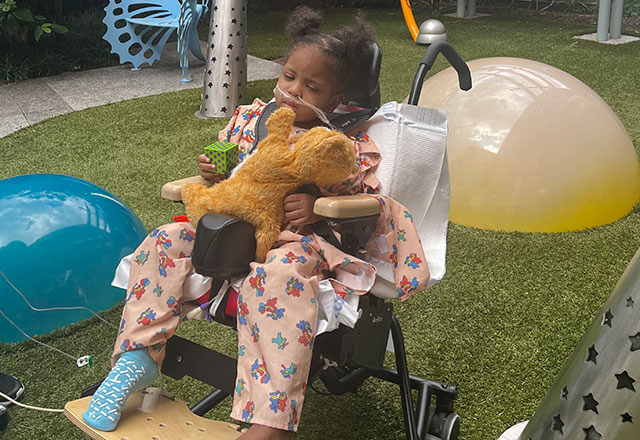Rose's Story

Ramona was concerned when her daughter, Rose, developed a 104-degree fever. After taking her to a local hospital, Ramona was told her daughter likely had a stomach virus that would pass overnight. But when the fever got worse, and over-the-counter medications were no longer working, Rose was taken to the emergency room at Johns Hopkins Children’s Center, where she was diagnosed with pneumonia.
At the emergency room, Rose’s arms, legs, stomach and face became swollen, and she was no longer urinating. Doctors told Ramona that Rose also had hemolytic uremic syndrome, a rare but serious disease that affects the body’s kidneys and blood clotting functions.
In addition, Rose’s pneumonia progressed to strep pneumonia, which can happen if the bacteria get into the bloodstream, lungs or muscles. This progression led the doctors to transfer her to the pediatric intensive care unit (PICU). “I started crying, and I was like, ‘What is going on? This can’t be happening to my kid,’” Ramona says.
The first few weeks in the PICU presented challenges for Ramona and Rose. During the second week that she was there, Rose’s health took a turn and she coded for nearly 12 seconds before doctors were able to bring her back. Once they resuscitated her, the doctors moved Rose to a different part of the PICU, where she could be on extracorporeal membrane oxygenation (ECMO). “A staff [member] said, ‘This is going to be good for her … I’ve seen miracles happen in this room.’ Ramona says. “I couldn’t do anything but sit there and be patient and say OK.”
The doctors put Rose into a medically induced coma to help her heal. After 30 days on ECMO, Rose’s lungs began to clear up. Her kidneys and lungs started working again, and the doctors began weaning her off the medications.
“It was the most beautiful thing when I saw that little girl’s eyes open,” Romana says.
Rose had to relearn how to walk and talk again, aided by the physical therapy team. After two and a half months, doctors determined that her lungs had healed enough that she could transfer to a local pediatric hospital for additional therapy.
“I’m so glad that I brought my child to Hopkins,” says Ramona. “They treat you like family, instead of like a patient. The staff isn’t, ‘I need to treat your child and go.’ They take their time with you. They want to make sure you understand before they leave the room.”
Today, Rose is a happy little girl who is back to running around her living room and playing with her mother and her grandmother, Rosalie. Though she still has to attend doctor’s appointments as part of her ongoing recovery, Rose handles her situation with composure and maturity, says her mother. “She’s just strong and beautiful. She’s my miracle.”

